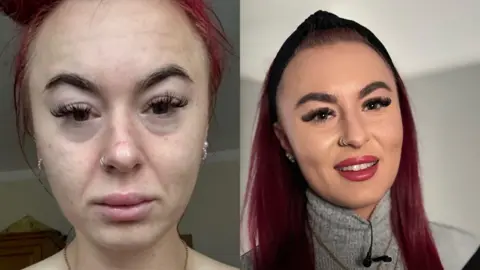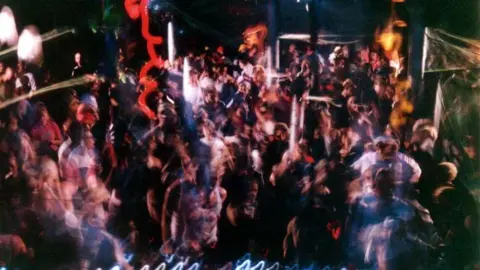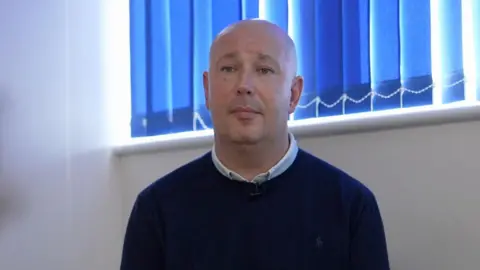Hooked on ketamine - Gen Z's drug of choice
 BBC
BBCEvery generation seems to have an association with an illegal drug. Baby boomers had LSD, Gen X had pills and millennials had cocaine. So could ketamine be Gen Z's drug of choice?
The latest government figures show that the drug's usage among 16-24 year olds in England has tripled since 2016.
Casey Innalls, a recovering addict from Portsmouth, never imagined her casual use of the substance in her teens would lead to a crippling addiction in adulthood.
"I was so hooked that I was in hospital for ketamine problems and I was sniffing ketamine in my hospital bed," she says.
Paul Spanjar, the head of an addiction rehabilitation centre in Bournemouth, says: "Last year we actually treated more ketamine users than every other drug put together."
Illegal use of the drug has reached record levels in recent years, with an estimated 269,000 people aged 16-59 reporting ketamine use in the year ending March 2024.
Last month, it was announced by the Home Office that ketamine could be upgraded to a Class A drug as the government seeks expert advice on its classification.
 Getty Images
Getty ImagesMiss Innalls' first experience taking the drug was at 16 years old, in a setting familiar to most teens - a house party.
"I felt like I was walking on the moon," she says.
"I remember vividly walking up the stairs and my feet felt like they were just sinking.
"It's a totally different feeling to a lot of other drugs."
At 18 years old, her relationship with ketamine worsened, following the passing of her father.
"By 20 and 21, I was using it every single day. I started using it profusely, any event," she explains.
"It went from trying it, first time usage. Then at parties and festivals. Then I'd do it every weekend at the pub. Then I'd do it throughout the week and it became a regular occurrence for me.
"And yeah, it ruined my life."
Ketamine is widely used in the NHS as an anaesthetic, sedative and pain reliever, and is also commonly used on animals.
It usually comes as a crystalline powder or liquid. It is also thought of as a party drug due to its hallucinogenic effects.
But Miss Innalls' addiction led to a serious decline in her health.
She experienced so-called "k-holes" and "k-cramps", which are side effects of taking the drug in excess.
"I would cry whilst doing the substance, saying 'don't do it Casey, don't do it' and it felt like insanity, but I genuinely couldn't stop," she explains.
Using ketamine caused serious damage to her urinary system.
"I was weeing out the lining of my bladder and pure blood," she says.
Experts are warning of an alarming increase in bladder issues among young people due to chronic ketamine use.
At 27, 11 years since she first tried ketamine, Miss Innalls decided it was time for professional help.
With support from her grandparents, she checked in to the Providence Projects in Bournemouth, an addiction rehabilitation centre.

Mr Spanjar, the centre's chief executive, has worked in rehabilitation for more than 23 years and described the growth of ketamine usage as an "epidemic".
"We used to see the odd person with a ketamine addiction 20 years ago but it was really, really rare.
"Last year we actually treated more ketamine users than every other drug put together.
"I've never seen a drug become so popular so quickly."
The latest figures from UK police back that up - forces say they seized 189% more ketamine in 2023 than in the year before.
And Mr Spanjar acknowledged that like most drugs, culture and fashion played a role in the its growth.
"When things take off, there's a huge peer element in drug use, people will use what their friends use, so there is a snowball effect when we look at how many people are taking it."
However, he thinks mental health issues are a bigger factor contributing towards its popularity.
"Ketamine is what's known as a dissociative," he says.
"We have a generation of young people who are so affected by anxiety, depression, loss of hope, fear of the future, and are carrying around this huge burden.
"The perceived effect of ketamine is that it takes away those feelings and stops people caring quite as much."
He explains the substance was also cheaper than others: "Approximately a quarter of the price of cocaine", and had "less of a 'come-down' nature than other stimulants.
"In the beginning, so many people take ketamine because it feels like the answer.
"Unfortunately this isn't the story at the end."
Miss Innalls had started taking illegal ketamine regularly because she wrongly believed it would help her mental health issues.
But like a lot of addicts, she eventually relied on it to help with physical pains caused by her usage.
"By the end I was sniffing it for a pain relief," she says.
"My routine was: I'd wake up, roll over, sniff a line.
"Go to the toilet, come back, sniff a line.
"Go to the toilet, go downstairs, make a green tea, go to the toilet, sniff a line.
"I'd then lay in bed in pain, so I'd sniff a line."
After more than a decade of using ketamine, Miss Innalls has been in recovery for almost six months.
She has used TikTok to document her journey and support others who might find themselves in a similar situation.
"I just wanted to help people," she explains.
"I thought I was the only one struggling but there are so many people struggling and they don't even know where to go for help.
"I get a lot of young people reaching out to me - I get parents reaching out to me for advice.
"There's a massive stigma around ketamine. It isn't spoken about enough."
If you've been affected by any of the issues in this story you can find help and support via BBC Action Line here.
